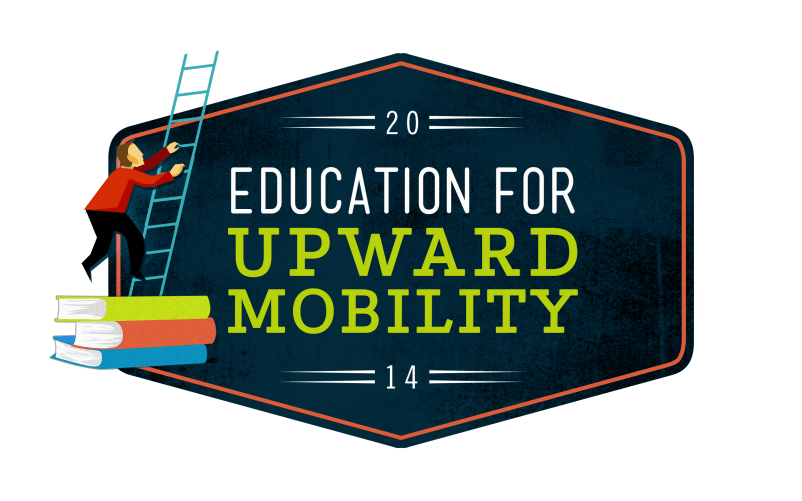
This is an excerpt from Michael J. Petrilli’s opening comments at the Education for Upward Mobility conference. Read the whole speech here; video from the event is available here; the ten papers that were presented are available here.
One of the most important questions in America today is: How can we help children born into poverty transcend their disadvantages and enter the middle class as adults? And in particular, what role can our schools play?
These aren’t new questions. When President Lyndon B. Johnson signed the Elementary and Secondary Education Act fifty years ago, he remarked, “As a son of a tenant farmer, I know that education is the only valid passport from poverty.”
Or, as Jeb Bush put it two weeks ago, quoting Horace Mann: “Education is the great equalizer.”
What is new is the nagging concern (shared across the ideological spectrum) that social mobility in the U.S. has stalled. As conservative scholar Peter Wehner wrote recently, “Two-thirds of Americans believe that it will be harder for them to achieve the American Dream than it was for their parents, and three-quarters believe that it will be harder still for their children and grandchildren to do the same.” And sure enough, the numbers are sobering, particularly for the poorest among us. Richard Reeves of the Brookings Institution explains, “Children born on the bottom rung have a four-in-ten chance of remaining stuck there in adulthood.”
There’s little doubt that education and opportunity are tightly joined in the twenty-first-century economy. Almost every week brings a new study demonstrating that highly skilled workers are rewarded with higher pay and excellent working conditions, while Americans with few skills are struggling.
Expanding educational achievement, then, is a clear route to expanding economic opportunity. Yet much of our public discourse ends there. Of course more young Americans need better education in order to succeed, especially young Americans growing up in poverty. But what kind of education, and to what end? Is the goal college for all? What do we mean by college? Is that too narrow an objective? How realistic is it? Do our young people mostly need a strong foundation in academics? What role should so-called non-cognitive skills play? Should technical education make a comeback? After all, current policy stresses getting students college- and career-ready. But what exactly does that mean—especially the “career” part? How about apprenticeships? Can we learn from the military’s success in working with disadvantaged youth?
Finding better answers to these questions is critically important if we want to make headway in interrupting intergenerational poverty, which is the real goal of the education-reform movement—the ultimate student outcome that we’re working so hard to achieve.
To be sure, schools aren’t the only institutions responsible for boosting upward mobility. Far from it. Yet for years we’ve been having a debate between the education reformers on one side and the fix-poverty crowd on the other. Like many debates in education, that’s a silly argument based on a false dichotomy. Of course, schools can’t do it alone. But, of course, schools could be doing more. But what, precisely?
***
A few years ago, I started to have a gut feeling—a nagging suspicion—that we in the education-reform movement might be barking up the wrong tree. Namely, that we might be overly focused on college as the pathway to the middle class, and not focused enough on all of the other possible routes. My concern was that the “theory of action” guiding most of our education-reform efforts might not be entirely sound—meaning that some of our policies and day-to-day actions could be misguided.
And what is our theory of action? What guides most K–12 education reforms today? Here’s how I would describe it:
We look at an economy that rewards people with college degrees and measurable skills—and punishes people without degrees and without skills. We see a widening gap in this country between the highly educated and the poorly educated—gaps that show up not only in income inequality, but also in family formation, civic participation, health, happiness, you name it.
We conclude that we need to get dramatically more young people, and especially low-income young people, into and through higher education. Ideally that means four-year degrees, though two-year degrees and industry credentials are good, too. We firmly believe that a high school diploma is not enough.
The contemporary reform agenda reflects this theory of action—starting with enriching pre-schools; Common Core for grades K–12; effective teachers; no-excuses, college-prep charter schools; and intensive efforts to help first-generation college students make it not just to, but all the way through, college. Most of the focus is on academics—especially in reading and math—though we share a growing interest in non-cognitive skills, or what some call performance character. These are the traits that will help students persist in high school and in post-secondary education.
This worldview looks at an eighteen-year-old who grows up poor, graduates high school, and starts working full-time in a low-wage job as something of a failure. We failed that kid. We didn’t get him to and through post-secondary education. He ended up on the wrong side of an increasingly sharp educational divide.
But does that worldview and theory of action make sense?
What if that eighteen-year-old, for example, goes on to stay in that low-wage job, gaining important skills along the way, and starts to get raises? What if that eighteen-year-old avoids the poverty traps of early fatherhood, incarceration, and substance abuse? What if, by age twenty-four, that young man is earning $25,000 a year, is self-sufficient, a good role model, and an upstanding member of his community? Have we failed him? What if, at twenty-four, he’s now ready to gain some additional skills and get an industry-certified credential in order to get one of those middle-skilled jobs—which, by the way, are quite plentiful?
What if we’re wrong that stopping with a high school diploma is equivalent to a life of certain poverty? What if there’s no sharp educational divide, and instead it’s more like an educational continuum—but we’ve ignored the routes in the middle of that continuum, the middle-class jobs that require technical skills?
What if, by putting all of our focus on preparing students for higher education, we’re overlooking other issues that matter just as much, like decisions around parenting or a strong work ethic? Or the acquisition of useful workplace skills while in high school? What if, by spending all of our efforts trying to boost the proportion of low-income students who are making it through college from 10 percent to, say, 20 percent, we’re ignoring the needs of the other 80 percent?
What if we’re wrong that low-wage work is a cause of poverty? What if we learn that the true cause of poverty in America is not working at all? What if we put our minds toward solving that problem?
***
My hope is to spur an honest conversation about these issues and more, and find a middle ground between the utopianism that characterizes so much of the reform movement (“Let’s get every child college and career ready!”) and the defeatism that emanates from too many corners of the education system (“There’s nothing we can do until we end poverty!”).
We can all agree that intergenerational poverty is fundamentally un-American; sharply reducing it is an objective we can all embrace. The only question is how. Let’s stay open to any and all good answers.
photo credit: Nancy Bell

